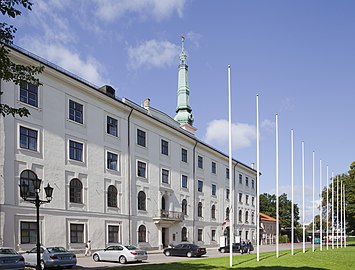Vecrīga
You can help expand this article with text translated from the corresponding article in Latvian. (March 2011) Click [show] for important translation instructions.
|
Vecrīga | |
|---|---|
Neighbourhood of Riga | |
| Vecpilsēta | |
 The Old Town of Riga | |
 Location of Vecpilsēta in Riga | |
| Country | |
| City | |
| District | Central District |
| Area | |
| • Total | 0.944 km2 (0.364 sq mi) |
| Population (2017) | |
| • Total | 3,336 |
| • Density | 3,500/km2 (9,200/sq mi) |
| Website | apkaimes.lv |
| Official name | Historic Centre of Riga |
| Type | Cultural |
| Criteria | ii, i |
| Designated | 1997 |
| Reference no. | [1] |
| UNESCO region | Europe |
Vecrīga ("Old Riga") is the historical center and a neighbourhood (as Vecpilsēta) of Riga, Latvia, located in the Central District on the east side of Daugava River. Vecrīga is famous for its old churches and cathedrals, such as Riga Cathedral and St. Peter's Church.
History
This section needs expansion with: full summary from the Latvian language in the corresponding article. You can help by adding to it. (November 2021) |
Vecrīga is the original area of Riga and consists of the historic city limits before the city was greatly expanded in the late 19th century. In the old days, Vecrīga was protected by a surrounding wall except the side adjacent to the Daugava river bank. When the wall was torn down, the waters from Daugava filled the space, creating Riga City Canal.[2]
Heritage
In the early 1990s, Vecrīga's streets were closed to traffic and only residents of the area and the local delivery vehicles were allowed within Vecrīga's limits with special permits. Vecrīga is part of a UNESCO World Heritage Site listed as "Historic Centre of Riga", which also includes most of the surrounding Centrs district.[3]
Vecrīga is the oldest part of the Riga, and — even though in its primordial state most of the buildings were made of wood — currently, there are a lot of architectural works remaining from the times of renaissance, baroque and medieval times in the middle of the unique and notable buildings in the style of Art Nouveau, especially the ones created by the locally and internationally well-known architect Mikhail Eisenstein.
Landmarks
Churches
- Church of St. Peter
- The Dome Cathedral
- Cathedral of Saint James
- Church of Saint John
- Church of Our Lady of Sorrows
- Anglican Church
- Reformed Church
- Church of Mary Magdalene
Museums
- Military Museum
- Museum of the History of Riga and Navigation
- Sports Museum
- Latvian Museum of Pharmacy
- Latvian Museum of Photography
- Riga castle
- Latvian Museum of National History
- Art Museum Riga Bourse
- Museum of Decorative and Applied Arts
- Museum of the Occupation of Latvia
- Latvian Museum of Architecture
- Riga Film Museum
Gallery
-
The original boundaries of the Old Riga in 1637
-
The House of the Blackheads in Vecrīga
-
Reconstructed section of the medieval city wall
-
Riga Castle in Vecrīga
-
Riga Town Hall in Vecrīga
-
Houses and streets in Vecrīga, with an aerial view of the town hall
-
View of Vanšu Bridge
See also
References
- ^ "Riga Historic Centre". UNESCO World Heritage Centre. Retrieved 2022-01-01.
- ^ Kadinsky, Sergey "Pilsētas Kanāls, Riga" Hidden Waters Blog July 5, 2016
- ^ "World Heritage List — Riga (Latvia); No. 852" (PDF). unesco.org. pp. 3 (67). Retrieved 2009-07-25.
External links
 Media related to Vecrīga at Wikimedia Commons
Media related to Vecrīga at Wikimedia Commons- Multimedia virtual tour of Old Riga








